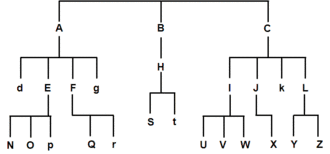Tharavad
Tharavad, also spelled as Tharavadu (ⓘ) (തറവാട്), is the Malayalam word for the ancestral home of aristocratic families in Kerala, which usually served as the common house for the joint family system practiced in the state.[1][2]

1901 photograph of a tharavadu

A typical tharavadu reproduced from K. M. Panikkar's article published in 1918. Capital and small letters represent females and males respectively. Supposing that the females A, B and C were dead and the oldest male member karnavar being d, if the male members t, k and others demanded partition, the property would be divided into three parts.
The German linguist Hermann Gundert, in his Malayalam—English dictionary published in 1872, defines a Tharavadu as, "An ancestral residence of land-owners and kings", and also as, "A house, chiefly of noblemen".[3] Contemporary usage of the word is now more generic to all social classes and religions in Kerala. By extension, the word refers not just to the family's house but to the extended family that shares that house.
References
- Kakkat, Thulasi (18 August 2012). "Kerala's Nalukettus". The Hindu. Retrieved 13 December 2017.
- Kunhikrishnan, K. (12 April 2003). "Fallen tharavads". The Hindu. Retrieved 13 December 2017.
- Hermann Gundert (1872). A Malayalam and English Dictionary. C. Stolz. p. 434. Retrieved 15 February 2017.
Wikimedia Commons has media related to Nālukettu.
This article is issued from Wikipedia. The text is licensed under Creative Commons - Attribution - Sharealike. Additional terms may apply for the media files.